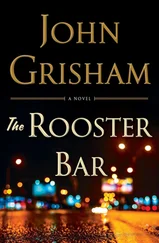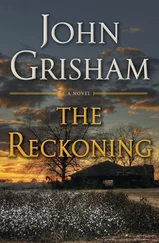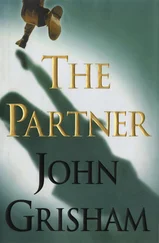Sadelle sucked in some air and growled, “And tell me again. How did Betty Roe know about this connection?”
Lacy said, “She says in her complaint that she found a former partner of the big firm, a guy same age as Bannick, and he was in the intern class of 1989. Thus he knew Bannick well, maybe still does for all we know. Says he really wanted the job and took the rejection hard.”
Sadelle said, “Added it to his list. Take a name now, kick an ass years later.”
“Something like that. Twenty-plus years.”
“Sure hope I haven’t done anything to upset him. But I’m more than half dead anyway.”
“Enough of that.”
“You’ll outlive all of us,” Darren said.
“Wanna bet?”
“How do I collect if I win?”
“Good point.”
Lacy closed the file and looked at her task force. “So, folks, where exactly are we now? We know that Bannick knew two of the victims, which was alleged by Betty in her complaint. As I’ve said, she has given me documentation, off the record so far, of five more murders involving five more victims who had the misfortune of angering Judge Bannick somewhere along the way. Thankfully, we don’t have to worry about those.”
“Why don’t we just go to the state police?” Sadelle asked.
“Because they’re already on the case, have been from the Kronke murder. We saw the file, hundreds of pages.”
“Thousands,” Darren said.
“Okay, thousands. They talked to dozens of people who knew Kronke in and around Marathon. Nothing. They checked every boat rental record, every fuel purchase, every new fishing license. Nothing. They talked to his former law partners in Miami. Nothing. And former clients. Nothing. His family. Nothing. They’ve done a thorough job of digging into the victim’s past and present, and they have come up with exactly nothing. Not a decent lead anywhere. They’ve done their work, have nothing to show for it, and so it’s just sitting there, another cold case waiting on a miracle.”
Darren said, “I’m flying back down to Miami on Wednesday to meet with the state investigators. I’ve talked to them several times on the phone and they seem willing to at least indulge us. I’m sure I’ll see the same file we saw in Marathon, but you never know. Maybe they know something that Chief Turnbull doesn’t.”
Sadelle wheezed and said, “So, why not tell them about Bannick? If we know the killer’s name, or at least we have a sworn complaint alleging he did it, why not hand that information over to the investigators?”
She arched her shoulders and braced for another intake. Her machine hummed a bit louder as she strained. “I mean, look, Lacy, we’re just spinning our wheels here. There’s really not much for us to do. The real cops have billion-dollar budgets, everything from bloodhounds to helicopters and satellites, and they can’t solve the crimes. How are we supposed to? I say we punt this thing over to the state police and let them go after him.”
Darren said, “That’s where it’s headed.”
Lacy said, “Maybe so, but I promised Betty we wouldn’t involve the police until she approves.”
“That’s not how we operate, Lacy,” Sadelle said. “Once the complaint is filed it becomes our jurisdiction. The complaining party is not allowed to dictate how we proceed. You know that.”
“I do, but thanks for the lecture.”
“Don’t mention it.”
“She’s using us, Lacy,” Darren said. “Just like we discussed last week. Betty wants to hide behind us and get the police involved. So, that’s our next step.”
“We’ll see. Go to Miami, meet with the state boys, and give us a report next Monday.”
That afternoon, Lacy left early and drove across town to a complex filled with two-story office buildings. The suite owned by R. Buford Furr was quiet, plush, well appointed, and spoke of a successful lawyer. There were no other clients waiting in the reception area and a handsome young intern was answering the phone. At precisely four, he escorted Lacy back to a sprawling war room where Buford did battle with the world. He hugged her warmly as if they had been friends for years and showed her to a sofa that probably cost more than her car.
Furr was one of the top trial lawyers in Florida and had many large verdicts to brag about. Which he did, with framed newspaper headlines and photos on his walls. All lawyers knew of him, and when Lacy had decided to sue over the staged car wreck that injured her and killed Hugo Hatch, her former colleague, she really had no choice.
Verna Hatch, Hugo’s widow, hired him first and they filed a wrongful death action seeking $10 million. A week later, Furr sued on Lacy’s behalf. The lawsuits had been stymied by an unusual obstacle — an abundance of cash. The crime syndicate that had skimmed millions from an Indian casino had buried its loot around the world. The Feds were still finding it, and the fact that there was so much of it was attracting an astonishing number of aggrieved parties. And their lawyers. The state and federal court dockets were loaded with claims.
The most serious impediment to a resolution was a huge and complicated federal lawsuit involving the conflicting claims of the Native Americans who owned the casino. Until that mess was settled, no one really knew how much cash would be left for the other aggrieved parties, including Lacy and Verna Hatch.
Furr walked her through the latest developments in the asset forfeiture proceedings and other litigation. He frowned when he said, “Lacy, I’m afraid they want to take your deposition.”
“I don’t want to go through that,” she said. “We’ve talked about this.”
“I know. One problem is that the attorneys appointed by the court to hand out the money are working by the hour, at very good rates, and they’re in no hurry to wrap things up.”
“Gee. I’ve never heard that before.”
Furr laughed and said, “We’re not talking about small-town Tallahassee rates. These guys are billing eight hundred bucks an hour. We’ll be lucky if there’s anything left.”
“Can’t you complain to the judges?”
“There are lots of complaints. Everything is contentious right now.”
Lacy thought for a moment as Furr watched her. “A depo won’t be that bad,” he said.
She said, “I’m not sure I can relive that car crash, the image of Hugo covered in blood. Dying, I guess.”
“We’ll have you prepped. You’ll need the experience because you may have to take the stand if the case goes to trial.”
“I don’t want a trial, Buford. I’ve made myself clear. I’m sure you would like a big production, with plenty of bad guys sitting at the defense table, the jury in your pocket as always. Another big verdict.”
Furr laughed. “That’s what I live for, Lacy. Can you imagine hauling those crooks back from prison to sit through a trial? It’s a lawyer’s dream.”
“Well, it’s not mine. I can handle a deposition but not a trial. I really want to settle, Buford.”
“We will, I promise. But right now we have to play the discovery game.”
“I’m not sure I’m up to it.”
“You want to dismiss our case?”
“No. I want it to go away after we settle. I still have nightmares and the lawsuit doesn’t help.”
“I understand, Lacy. Just trust me, okay? I’ve been down this road many times. You deserve a generous settlement and I promise I’ll get one.”
She nodded her gratitude.
Sergeant Faldo was re-indexing rape kits when the phone in his pocket rattled. It was his boss, the boss, the chief of all Pensacola police, and he was as blunt as usual. He said that Judge Ross Bannick needed to check an old file that afternoon. He would be in court until at least four but would meet with Faldo at precisely four thirty. Faldo was ordered to do whatever His Honor wanted. “Just kiss his ass, okay?”
Читать дальше












